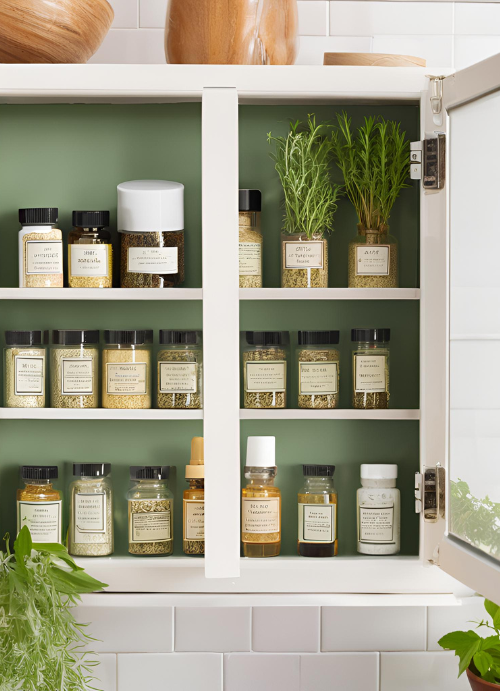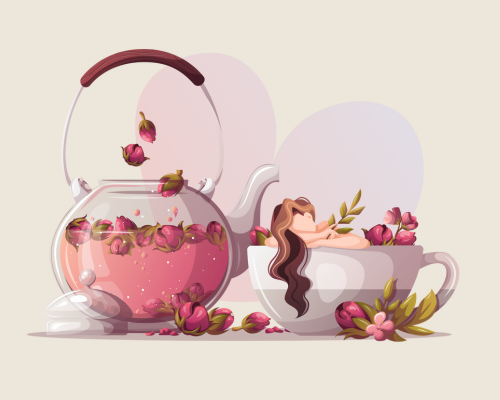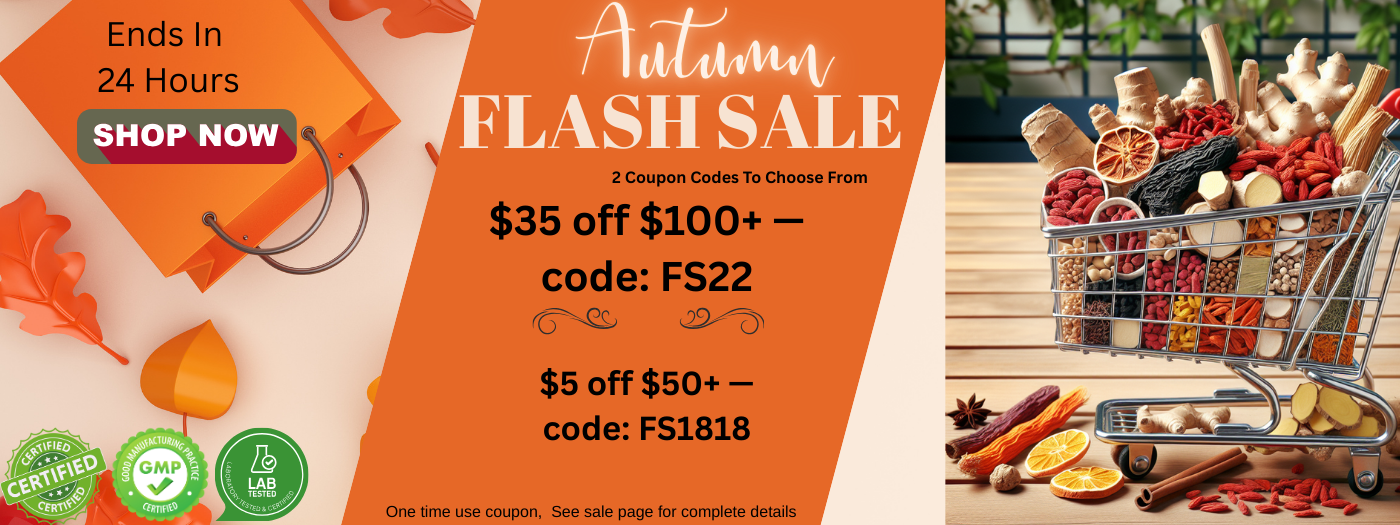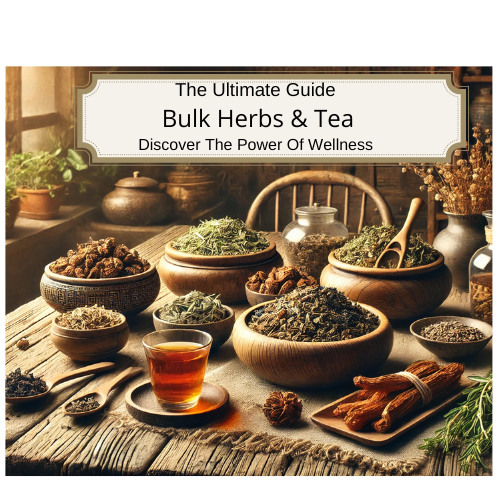Herbs You Think You Don’t Need (But Totally Do): The Chinese Medicine Cabinet Makeover You Didn’t Know You Needed
Jun 1st 2025
Herbs You Think You Don’t Need (But Totally Do): The Chinese Medicine Cabinet Makeover You Didn’t Know You Needed
Welcome to the Chinese medicine glow-up your wellness cabinet didn’t see coming.
Let’s be upfront and just open up for real! Open your medicine cabinet right now. What’s in there? A half-empty bottle of expired cough syrup, three kinds of band-aids (none the right size), and a jar of menthol rub that smells like your grandma’s purse and your gym locker had a baby. Maybe there’s a mystery vitamin bottle with no label. You’ve got crisis mode covered—but what about prevention? What about vitality? What about ancient herbal formulas that have been keeping humans upright, breathing clearly, and digesting without drama since before the invention of socks?
That’s where Traditional Chinese Medicine (TCM) comes in. These herbs didn’t just show up in the last wellness trend cycle—they’ve been around for thousands of years, with receipts. They don’t just patch you up—they help your body not fall apart in the first place.
So go ahead, dust off that shelf. It’s time to give your wellness stash a makeover your spleen (and your chi) will thank you for.
 The Problem With Modern Cabinets (Ahem...Where Are the Herbs?)
The Problem With Modern Cabinets (Ahem...Where Are the Herbs?)
Your medicine cabinet is full of quick fixes: painkillers, antacids, and whatever that half-used essential oil was supposed to fix. But what happens when you want to support your body before things go sideways? That’s where Traditional Chinese Medicine (TCM) steps in.
These herbs aren’t just reactive. They’re proactive, preventative, and dare we say... profoundly underrated.
Herb #1: Huang Qin (Scutellaria baicalensis)
For when your stomach throws a tantrum.
Bloating, diarrhea, mystery discomfort? Huang Qin is the bitter buddy you didn’t know you needed. It clears heat, cools inflammation, and gives your gut the "please chill out" message it desperately needs.
-
Why it works: Anti-inflammatory, antimicrobial, liver-cooling powerhouse.
-
How to use: Decoction, capsule, or powder mixed in warm water.
"You probably didn’t come here thinking, ‘What I need is a bitter root that tastes like my childhood trauma.’ But here we are."
Herb #2: Gou Teng (Uncaria rhynchophylla)
For when your stress is stressing you out.
Gou Teng helps calm the Liver (TCM code for your inner Hulk). Used for tension, headaches, and even high blood pressure.
-
Why it works: Anchors Yang, calms internal wind, relieves tension.
-
How to use: Tea or as part of a calming formula with Tian Ma.
 Herb #3: He Huan Pi (Albizia Bark)
Herb #3: He Huan Pi (Albizia Bark)
The “Calm the heck down” herb.
Known as the "herb of happiness," He Huan Pi helps with emotional tension, grief, sleep issues, and mood dips.
-
Why it works: Nourishes Heart and Liver, relieves constraint.
-
How to use: Tincture or capsule.
Herb #4: Ban Lan Gen (Isatis root)
Hello sore throat, goodbye plans.
Ban Lan Gen is your go-to when you feel something coming on—especially in the throat, lymph, or sinuses.
-
Why it works: Clears heat, detoxifies, antiviral and antibacterial.
-
How to use: Instant herbal granules or decoction.
Herb #5: Mu Xiang (Saussurea root)
Digestive chaos? Meet your herbal fixer.
Gas, bloating, sluggish digestion after one too many dumplings? Mu Xiang keeps Qi moving in the digestive tract.
-
Why it works: Moves Qi, relieves food stagnation.
-
How to use: Powder or added to digestive formulas.
Herb #6: Tian Ma (Gastrodia elata)
Tension headache? Brain fog? Meet your bestie.
Used to calm wind and relieve dizziness, Tian Ma is a favorite in formulas for neurological support.
-
Why it works: Calms Liver wind, opens the channels.
-
How to use: Cook in soup or use in capsule form.
Safety Tips: Yes, You Still Need a Brain (and a Practitioner)
While these herbs are amazing, they’re powerful. Not every herb fits every body. If you’re pregnant, on meds, or have complex conditions, talk to an herbalist or trained practitioner.
TCM Says:
Your search history says "herbal cure for fatigue, bloating, and existential dread."
TCM says: "Let’s diagnose the root cause, support your organs, and rebalance your entire system."
Bonus Round: The Herbs You Didn’t Think Were Superstars
-
Yi Yi Ren (Coix seed): For draining damp and clearing skin.
-
Chen Pi (Aged tangerine peel): For bloating and that full-feeling after sushi.
-
Zhi Gan Cao (Honey-fried licorice): For stress, spasms, and digestive sweetness.
| Stock your herbal cabinet before you’re sick. TCM is about preparation, not panic. With herbs like Ban Lan Gen and Huang Qin on hand, you’ll be ready—not reactive. |
Let’s get herbal. Let’s get balanced. Let’s make your medicine cabinet worthy of a 5,000-year tradition—not a last-minute panic purchase.
Because let’s be honest: waiting until you’re already sick to think about herbs is like trying to buy flood insurance after your basement's underwater. Not ideal. The worst time to realize you need Ban Lan Gen or Huang Qin is when your throat feels like sandpaper, your sinuses are staging a rebellion, or your digestion has gone full drama queen—and now you're stuck refreshing the shipping tracker, praying your herbs arrive before your symptoms peak.
Don’t let your future self down. Stock your cabinet now, while you’re still upright, hydrated, and clear-headed. TCM isn’t just about reacting—it’s about preparing, preventing, and staying a few steps ahead of whatever seasonal bug or stress spiral is coming your way.
Get the good stuff while the getting’s good. Because a true herbalist’s cabinet isn’t just stocked. It’s ready.
Not sure how to use these herbs, check out our step by step guide on How To Use Herbs
Huang Qin (Scutellaria baicalensis) – Anti-inflammatory and Gut Support
Huang Qin, also known as Scutellaria baicalensis, has been traditionally used for its anti-inflammatory properties. Modern studies have confirmed its efficacy:
-
A study demonstrated that Scutellaria baicalensis exhibits significant anti-inflammatory effects by inhibiting the expression of inflammatory cytokines and enzymes such as iNOS and COX-2. PubMed
-
Another research highlighted the antioxidative and anti-inflammatory activities of its polyhydroxyflavonoids, which contribute to its therapeutic effects. PubMed+1PubMed+1
2. Gou Teng (Uncaria rhynchophylla) – Stress and Tension Relief
Gou Teng, derived from Uncaria rhynchophylla, is recognized for its neuroprotective effects:
-
Research indicates that Uncaria rhynchophylla possesses neuroprotective properties, making it beneficial in managing conditions like epilepsy and neurodegenerative diseases.
3. He Huan Pi (Albizia julibrissin) – Mood and Sleep Support
He Huan Pi, or Albizia julibrissin, is traditionally used to alleviate stress and promote sleep:
-
Studies have shown that Albizia julibrissin exhibits antidepressant-like effects, supporting its use in mood enhancement and sleep regulation.
4. Ban Lan Gen (Isatis tinctoria) – Antiviral and Immune Support
Ban Lan Gen, obtained from Isatis tinctoria, has demonstrated antiviral properties:PubMed
-
A systematic review confirmed its traditional uses in antiviral and antibacterial treatments, highlighting its efficacy against various viruses. PubMed
5. Mu Xiang (Saussurea costus) – Digestive Aid
Mu Xiang, known as Saussurea costus, is utilized for digestive health:
-
Research supports its use in relieving gastrointestinal discomfort by promoting digestion and alleviating bloating. PubMed
6. Tian Ma (Gastrodia elata) – Neurological and Headache Relief
Tian Ma, derived from Gastrodia elata, is esteemed for its neurological benefits:
-
Studies have demonstrated its effectiveness in treating headaches, dizziness, and neurodegenerative disorders due to its neuroprotective properties. PubMed


